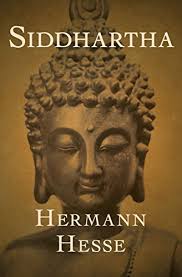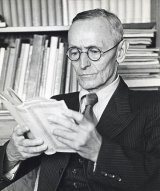Siddhartha Page #3
Siddhartha is a novel by Hermann Hesse that deals with the spiritual journey of self-discovery of a man named Siddhartha during the time of the Gautama Buddha. The book, Hesse's ninth novel, was written in German, in a simple, lyrical style.
The Father touched Siddhartha's shoulder. "You will," he spoke, "go into the forest and be a Samana. When you'll have found blissfulness in the forest, then come back and teach me to be blissful. If you'll find disappointment, then return and let us once again make offerings to the gods together. Go now and kiss your mother, tell her where you are going to. But for me it is time to go to the river and to perform the first ablution." He took his hand from the shoulder of his son and went outside. Siddhartha wavered to the side, as he tried to walk. He put his limbs back under control, bowed to his father, and went to his mother to do as his father had said. As he slowly left on stiff legs in the first light of day the still quiet town, a shadow rose near the last hut, who had crouched there, and joined the pilgrim--Govinda. "You have come," said Siddhartha and smiled. "I have come," said Govinda. WITH THE SAMANAS In the evening of this day they caught up with the ascetics, the skinny Samanas, and offered them their companionship and--obedience. They were accepted. Siddhartha gave his garments to a poor Brahman in the street. He wore nothing more than the loincloth and the earth-coloured, unsown cloak. He ate only once a day, and never something cooked. He fasted for fifteen days. He fasted for twenty-eight days. The flesh waned from his thighs and cheeks. Feverish dreams flickered from his enlarged eyes, long nails grew slowly on his parched fingers and a dry, shaggy beard grew on his chin. His glance turned to ice when he encountered women; his mouth twitched with contempt, when he walked through a city of nicely dressed people. He saw merchants trading, princes hunting, mourners wailing for their dead, whores offering themselves, physicians trying to help the sick, priests determining the most suitable day for seeding, lovers loving, mothers nursing their children--and all of this was not worthy of one look from his eye, it all lied, it all stank, it all stank of lies, it all pretended to be meaningful and joyful and beautiful, and it all was just concealed putrefaction. The world tasted bitter. Life was torture. A goal stood before Siddhartha, a single goal: to become empty, empty of thirst, empty of wishing, empty of dreams, empty of joy and sorrow. Dead to himself, not to be a self any more, to find tranquility with an emptied heard, to be open to miracles in unselfish thoughts, that was his goal. Once all of my self was overcome and had died, once every desire and every urge was silent in the heart, then the ultimate part of me had to awake, the innermost of my being, which is no longer my self, the great secret. Silently, Siddhartha exposed himself to burning rays of the sun directly above, glowing with pain, glowing with thirst, and stood there, until he neither felt any pain nor thirst any more. Silently, he stood there in the rainy season, from his hair the water was dripping over freezing shoulders, over freezing hips and legs, and the penitent stood there, until he could not feel the cold in his shoulders and legs any more, until they were silent, until they were quiet. Silently, he cowered in the thorny bushes, blood dripped from the burning skin, from festering wounds dripped pus, and Siddhartha stayed rigidly, stayed motionless, until no blood flowed any more, until nothing stung any more, until nothing burned any more. Siddhartha sat upright and learned to breathe sparingly, learned to get along with only few breathes, learned to stop breathing. He learned, beginning with the breath, to calm the beat of his heart, leaned to reduce the beats of his heart, until they were only a few and almost none. Instructed by the oldest of the Samanas, Siddhartha practised self-denial, practised meditation, according to a new Samana rules. A heron flew over the bamboo forest--and Siddhartha accepted the heron into his soul, flew over forest and mountains, was a heron, ate fish, felt the pangs of a heron's hunger, spoke the heron's croak, died a heron's death. A dead jackal was lying on the sandy bank, and Siddhartha's soul slipped inside the body, was the dead jackal, lay on the banks, got bloated, stank, decayed, was dismembered by hyaenas, was skinned by vultures, turned into a skeleton, turned to dust, was blown across the fields. And Siddhartha's soul returned, had died, had decayed, was scattered as dust, had tasted the gloomy intoxication of the cycle, awaited in new thirst like a hunter in the gap, where he could escape from the cycle, where the end of the causes, where an eternity without suffering began. He killed his senses, he killed his memory, he slipped out of his self into thousands of other forms, was an animal, was carrion, was stone, was wood, was water, and awoke every time to find his old self again, sun shone or moon, was his self again, turned round in the cycle, felt thirst, overcame the thirst, felt new thirst. Siddhartha learned a lot when he was with the Samanas, many ways leading away from the self he learned to go. He went the way of self-denial by means of pain, through voluntarily suffering and overcoming pain, hunger, thirst, tiredness. He went the way of self-denial by means of meditation, through imagining the mind to be void of all conceptions. These and other ways he learned to go, a thousand times he left his self, for hours and days he remained in the non-self. But though the ways led away from the self, their end nevertheless always led back to the self. Though Siddhartha fled from the self a thousand times, stayed in nothingness, stayed in the animal, in the stone, the return was inevitable, inescapable was the hour, when he found himself back in the sunshine or in the moonlight, in the shade or in the rain, and was once again his self and Siddhartha, and again felt the agony of the cycle which had been forced upon him. By his side lived Govinda, his shadow, walked the same paths, undertook the same efforts. They rarely spoke to one another, than the service and the exercises required. Occasionally the two of them went through the villages, to beg for food for themselves and their teachers. "How do you think, Govinda," Siddhartha spoke one day while begging this way, "how do you think did we progress? Did we reach any goals?" Govinda answered: "We have learned, and we'll continue learning. You'll be a great Samana, Siddhartha. Quickly, you've learned every exercise, often the old Samanas have admired you. One day, you'll be a holy man, oh Siddhartha." Quoth Siddhartha: "I can't help but feel that it is not like this, my friend. What I've learned, being among the Samanas, up to this day, this, oh Govinda, I could have learned more quickly and by simpler means. In every tavern of that part of a town where the whorehouses are, my friend, among carters and gamblers I could have learned it."
Translation
Translate and read this book in other languages:
Select another language:
- - Select -
- 简体中文 (Chinese - Simplified)
- 繁體中文 (Chinese - Traditional)
- Español (Spanish)
- Esperanto (Esperanto)
- 日本語 (Japanese)
- Português (Portuguese)
- Deutsch (German)
- العربية (Arabic)
- Français (French)
- Русский (Russian)
- ಕನ್ನಡ (Kannada)
- 한국어 (Korean)
- עברית (Hebrew)
- Gaeilge (Irish)
- Українська (Ukrainian)
- اردو (Urdu)
- Magyar (Hungarian)
- मानक हिन्दी (Hindi)
- Indonesia (Indonesian)
- Italiano (Italian)
- தமிழ் (Tamil)
- Türkçe (Turkish)
- తెలుగు (Telugu)
- ภาษาไทย (Thai)
- Tiếng Việt (Vietnamese)
- Čeština (Czech)
- Polski (Polish)
- Bahasa Indonesia (Indonesian)
- Românește (Romanian)
- Nederlands (Dutch)
- Ελληνικά (Greek)
- Latinum (Latin)
- Svenska (Swedish)
- Dansk (Danish)
- Suomi (Finnish)
- فارسی (Persian)
- ייִדיש (Yiddish)
- հայերեն (Armenian)
- Norsk (Norwegian)
- English (English)
Citation
Use the citation below to add this book to your bibliography:
Style:MLAChicagoAPA
"Siddhartha Books." Literature.com. STANDS4 LLC, 2024. Web. 22 Dec. 2024. <https://www.literature.com/book/siddhartha_24>.




Discuss this Siddhartha book with the community:
Report Comment
We're doing our best to make sure our content is useful, accurate and safe.
If by any chance you spot an inappropriate comment while navigating through our website please use this form to let us know, and we'll take care of it shortly.
Attachment
You need to be logged in to favorite.
Log In